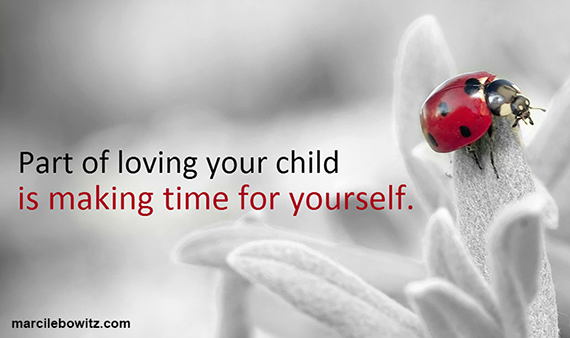If you're a parent or caregiver of a child with autism, or one with other complex special needs, you deserve a world of thanks. Special needs parenting can be incredibly challenging, and this is why the topic of parent self-care is so very important.
I believe that the more caring and loving you are to yourself, the more energy you have to be caring and loving to your child. It is too easy as a parent to completely neglect your own needs for the sake of your child. We've all done it, and it's a noble effort indeed, with the best of intentions. Unfortunately, this may work in the short run, but in the long run it too often creates burnout and heightened anxiety in both the parent and their special needs child.
So what are the steps to giving yourself the special care you need as the parent of a child with special needs?
1. Commit to giving yourself the same care you give to your child. You deserve it!
When you are raising a child with special needs, finding a moment to yourself can almost seem unreachable. We know. This is why it takes a very sincere commitment on your part to finding the time to practice self-care.
If you're inclined, take out a piece of paper and write in big letters, "I commit from this day forward to caring for myself with the same dedication that I have to my child." Maybe stick it to your bathroom mirror for a daily reminder. You can also take a picture of it and make it your smartphone background. Whatever works for you. And keep the goal in mind: a calmer me creates a calmer household and a calmer child.
2. Recognize the signs that you need to show yourself some love
Autistic children and other kids with special needs can be so sensitive to what is happening around them. They can often sense when you are at your wit's end even before you do, and this can trigger anxiety in them. If you can recognize the physical and mental signs that you need self-care before this happens, you and your child will both benefit. Here are a few things to watch out for, but please pay attention and find your own personal signs of need.
- Your muscles start to ache and get sore
3. Ask for help and give yourself some space, even if only for a moment
Sometimes it may seem like you're the only one who's fit to help your child, but please remember that you're not alone. A commitment to self-care will require some help from others, and sometimes even your child. The main thing you're trying to create is some space to practice self-care, and you may need some help to do this. Here's my best advice for willingly getting this help.
When you're asking your partner, family, or friends for help, consider doing it in the most loving way possible. It always seems that people are more willing to help when you approach them softly and genuinely when asking for help, even if in the back of your head you want to just scream, "You're gonna give me a hand here!"
Here's some advice for communicating to your child with special needs that you need some space to care for yourself. Take their hand gently in yours and see if you can catch their eyes. Warmly and calmly tell them that you know they're having a hard time right now, but that mommy/daddy needs a little break. Trust that even if they're nonverbal, they completely understand your need for self-care. They want you to do it. They want to feel you happy and calm.
4. Embrace the lows
In our culture we seem to have a very hard time accepting emotional lows and the need for self-care. I know for myself and many of the parents of autistic children I work with, their biggest breakthroughs and insights happen during these most sensitive of times. When you feel low your body is telling you to slow down and consider new possibilities. This is actually a good thing, so why fight it? Give yourself some space, practice self-care, and open yourself to new possibilities.
5. Fill yourself back up by doing what's calming and makes you happy
There is no secret formula here. Everyone enjoys different things. Listen to your heart and think about the things that calm you down and make you happy. For some, it's taking a bath and reading, and for others, it's taking a leisurely cruise on their Harley. When you get some space, do the things you enjoy to your heart's content, and know that you very well deserve it!
I do realize that in some cases you may only get a minute or two of space to practice self-care. In those situations, there are some universal things that people enjoy. One is taking a few slow deep breaths. Slow deep breathing is nature's prescription to get you out of fight-or-flight mode.
Make self-care a habit and watch things change for the better
Repeat these five steps as a habit. Watch for the signs so that you can catch yourself before your self-care bank account gets too low. I've seen so many parents experience the benefits of self-care. It can completely change your household dynamic.
After you've started practicing self-care on a regular basis, pay special attention to your child. You will see their moods, attitudes, and behaviors start to change for the better. I expand more on these thoughts and others in my free eBook you can get here, Autism Simplified for Parents. It's a quick and easy read with tons of useful, actionable information that will make your parenting life easier.
If you have time, please check out this beautiful video on self-care by my friend, Danelle Shouse, who helped me write this post.
